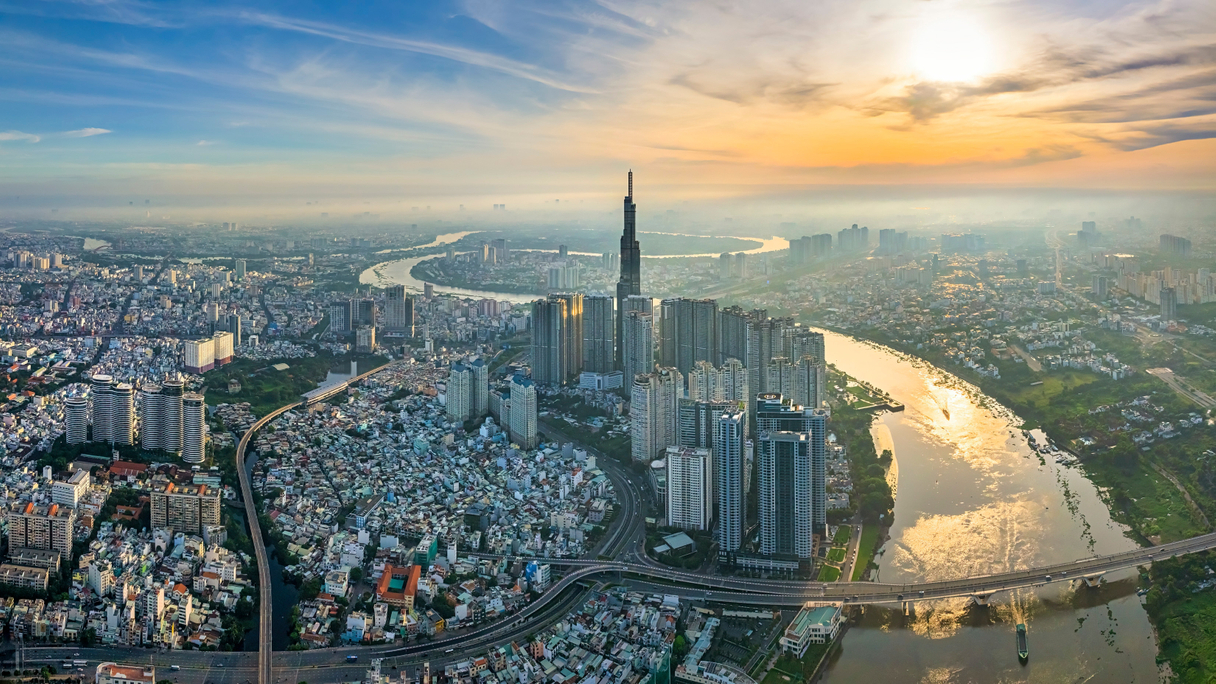Vietnam’s main indices returned nearly 10% in 2024, supported by a robust economic backdrop and corporate reforms that have translated into renewed risk appetite for the asset class. Despite disruptions caused by powerful Typhoon Yagi in September, the economy expanded by 7.4% during Q3 2024, exceeding government estimates, which forecast growth between 6.8% and 7% for the year.
The economic performance not only demonstrates a recovery from weather-related setbacks but also highlights underlying resilience. Q3 trade turnover increased by 19%, while foreign direct investment (FDI) reached $17 billion, according to Hung Nguyen, senior economist at Dragon Capital, Vietnam’s largest fund manager.
“The economy is shifting gears and grabbing global attention,” Nguyen said. Tech giants are increasing their footprint as ongoing industrialisation advances the nation’s manufacturing capabilities. Besides cost advantages, Vietnam is also the primary recipient of multinational corporations adopting ‘China + 1’ strategies, where those connected to US businesses are diversifying their manufacturing dependence beyond a single country.
The investment pivot from China to Vietnam has occurred without damaging diplomatic relations between Beijing and Hanoi. China remains Vietnam’s largest trading partner and crucial source of manufacturing imports. Bilateral trade grew by 21% in the first three quarters compared to the same period last year, reaching $148 billion.
Vietnam is attracting not only rudimentary industries but also sophisticated producers that require highly skilled workers to deepen their presence, thereby helping the country move up the manufacturing value chain.
The introduction of new tax subsidy schemes, such as the New Digital Industry Law expected to be passed in June 2025, will provide an institutional and financial framework to incentivise large-scale projects in semiconductors and data centres. Without a comprehensive national framework, most investment cases are handled on a case-by-case basis, which is less efficient, Nguyen explained to FinanceAsia.
Cautious approach remains
Hanoi’s success coincides as relations between Washington and Beijing have soured. Employing a strategy of Bamboo Diplomacy, a term underscoring a flexible foreign policy that embodies the characteristics of the indigenous plant capable of bending in multiple directions without breaking, Vietnam is navigating through geopolitical intricacies that other nations have also faced.
“While most are forced to pick a side, Vietnam has managed to position itself as a trustworthy partner to the economic rivals,” said Ismael Pili, head of institutional sales at Ho Chi Minh Securities Corporation, in a conversation with FA.
However, despite the investment tailwinds and harmonious relationships with the world’s two largest economies, Pili says that fund managers remain cautious, as uncertainties surrounding trade tariffs and their implications hang over the region. Even as Vietnam presents itself as an alternative hub to China, its current account surplus with the US attracts unwanted attention, making it a victim of its own success, he explains.
Among the unintended consequences is the criticism that Vietnam is transhipping goods to circumvent tariffs on Chinese products, with nearly finished items imported solely to be shipped out of the country to avoid a ‘Made in China’ label.
Hanoi is developing a systematic framework to better monitor these accusations, explained Dragon Capital’s Nguyen, adding that Vietnam’s Ministry of Industry and Trade is collaborating closely with the US Department of Commerce to expedite an agreement addressing rule of origin concerns.
Investment implications
Given the integration of Asia’s supply chains, trade tariffs anywhere could hinder new capital from flowing into the region. “With Trump’s return to the presidency, his administration may prefer a transactional approach to achieve early wins, leveraging tariffs or other economic tools to pursue US interests,” Nguyen noted, adding that the Trump administration could even tighten its restrictions further.
Those concerns are not without precedent. During his first term in office, president Trump classified Vietnam as a currency manipulator, which was a mostly symbolic designation. Plans to accuse other Asian exporters of unfairly devaluing their currencies could signal the new administration’s priorities in seeking trade deals as early wins.
Amid those uncertainties, the onus for incremental investments will fall onto corporate reforms and market developments in Hanoi to draw in foreign capital. Ranked as a FTSE frontier market since 2018, Vietnam hopes to be reclassified as an emerging market sometime in 2025, a move that should enhance market liquidity by passive funds tracking the global benchmark.
Ho Chi Minh Securities’ Pili noted that although passive funds bode well for the market, investors are still looking for future earnings potential, which could be hindered by elevated competition for skilled labour and unreliable power supplies.
Elevated household savings rates reflect the current reluctance to spend while the legacy of the anti-corruption campaign is also prompting corporations to become more risk-averse, even as monetary easing has lowered borrowing costs for new capacity.
That will likely keep the market volatile in 2025. Although Vietnam may be the best positioned to weather the geopolitical storm, it could also be the most vulnerable as well.
¬ Haymarket Media Limited. All rights reserved.

